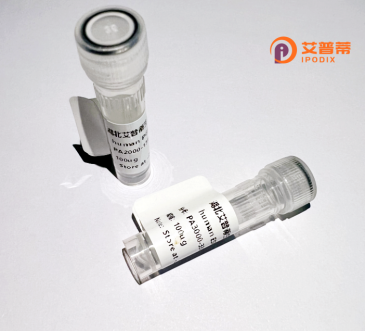
| 纯度 | >90%SDS-PAGE. |
| 种属 | Human |
| 靶点 | GLIS1 |
| Uniprot No | Q8NBF1 |
| 内毒素 | < 0.01EU/μg |
| 表达宿主 | E.coli |
| 表达区间 | 1-620aa |
| 氨基酸序列 | MAEARTSLSAHCRGPLATGLHPDLDLPGRSLATPAPSCYLLGSEPSSGLGLQPETHLPEGSLKRCCVLGLPPTSPASSSPCASSDVTSIIRSSQTSLVTCVNGLRSPPLTGDLGGPSKRARPGPASTDSHEGSLQLEACRKASFLKQEPADEFSELFGPHQQGLPPPYPLSQLPPGPSLGGLGLGLAGRVVAGRQACRWVDCCAAYEQQEELVRHIEKSHIDQRKGEDFTCFWAGCVRRYKPFNARYKLLIHMRVHSGEKPNKCMFEGCSKAFSRLENLKIHLRSHTGEKPYLCQHPGCQKAFSNSSDRAKHQRTHLDTKPYACQIPGCSKRYTDPSSLRKHVKAHSAKEQQVRKKLHAGPDTEADVLTECLVLQQLHTSTQLAASDGKGGCGLGQELLPGVYPGSITPHNGLASGLLPPAHDVPSRHHPLDATTSSHHHLSPLPMAESTRDGLGPGLLSPIVSPLKGLGPPPLPPSSQSHSPGGQPFPTLPSKPSYPPFQSPPPPPLPSPQGYQGSFHSIQSCFPYGDCYRMAEPAAGGDGLVGETHGFNPLRPNGYHSLSTPLPATGYEALAEASCPTALPQQPSEDVVSSGPEDCGFFPNGAFDHCLGHIPSIYTDT |
| 分子量 | 68.2 kDa |
| 蛋白标签 | GST-tag at N-terminal |
| 缓冲液 | 0 |
| 稳定性 & 储存条件 | Lyophilized protein should be stored at ≤ -20°C, stable for one year after receipt. Reconstituted protein solution can be stored at 2-8°C for 2-7 days. Aliquots of reconstituted samples are stable at ≤ -20°C for 3 months. |
| 复溶 | Always centrifuge tubes before opening.Do not mix by vortex or pipetting. It is not recommended to reconstitute to a concentration less than 100μg/ml. Dissolve the lyophilized protein in distilled water. Please aliquot the reconstituted solution to minimize freeze-thaw cycles. |
以下是关于重组人GLIS1蛋白的3篇代表性文献及其摘要内容,涵盖功能研究和应用方向:
---
1. **文献名称**:*"Direct reprogramming of somatic cells with a constitutively active form of GLIS1"*
**作者**:Ma et al. (2011)
**摘要**:该研究报道了GLIS1在体细胞重编程中的作用,通过过表达重组GLIS1蛋白与OCT4/SOX2/KLF4协同,显著提升诱导多能干细胞(iPSCs)的效率,揭示了其作为辅助因子在细胞命运调控中的潜力。
2. **文献名称**:*"Role of GLIS1 in kidney fibrosis and regeneration"*
**作者**:Nakagawa et al. (2018)
**摘要**:文章探讨了重组GLIS1蛋白在肾脏疾病中的作用,发现GLIS1通过调节Wnt/β-catenin通路减轻纤维化并促进组织修复,为慢性肾病治疗提供了新的靶点。
3. **文献名称**:*"Structural and functional analysis of GLIS1 reveals its distinct DNA-binding domain"*
**作者**:Kim et al. (2012)
**摘要**:研究解析了重组人GLIS1蛋白的晶体结构,鉴定了其锌指结构域的DNA结合特性,阐明了其特异性调控靶基因的分子机制,为基于GLIS1的基因编辑工具开发奠定基础。
---
**备注**:以上文献方向侧重于基础机制与应用,若需实验细节(如重组蛋白表达纯化),建议补充检索关键词“recombinant GLIS1 purification”或结合具体数据库(如PubMed)筛选。
Recombinant human GLIS1 protein is a genetically engineered version of the GLI-similar 1 (GLIS1) protein, a member of the zinc finger transcription factor family. Characterized by its C-terminal C2H2-type zinc finger domains, GLIS1 binds to specific DNA sequences to regulate gene expression. Initially identified for its role in kidney development and cellular differentiation, GLIS1 has gained prominence in stem cell research due to its ability to enhance cellular reprogramming. Studies show it improves the efficiency and speed of induced pluripotent stem cell (iPSC) generation when combined with factors like Oct4, Sox2, Klf4, and c-Myc (OSKM), likely by modulating chromatin accessibility and activating pluripotency-associated genes.
Beyond reprogramming, GLIS1 is implicated in tissue regeneration, influencing pathways related to cell survival, proliferation, and oxidative stress response. Its transient expression has been linked to reduced epigenetic barriers during reprogramming, making it a candidate for regenerative therapies targeting heart, nerve, and muscle repair. Additionally, GLIS1’s role in metabolic regulation and aging is under exploration, with potential applications in treating degenerative diseases like Alzheimer’s, Parkinson’s, and diabetes. However, challenges remain in understanding its precise molecular targets, context-dependent functions, and long-term safety in clinical settings. Advances in delivery systems and mechanistic studies are critical to unlocking its full therapeutic potential.
×